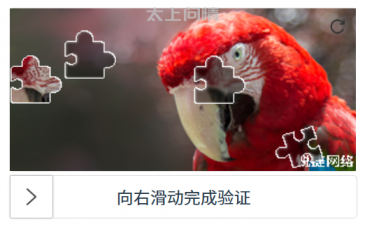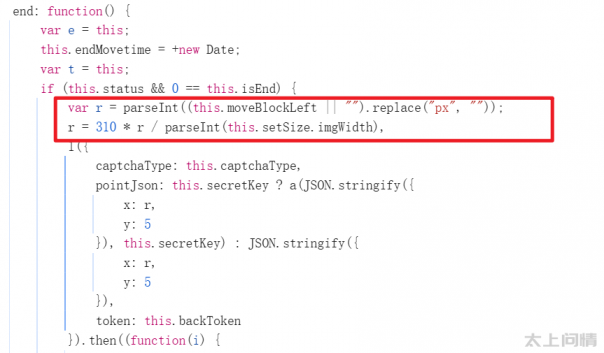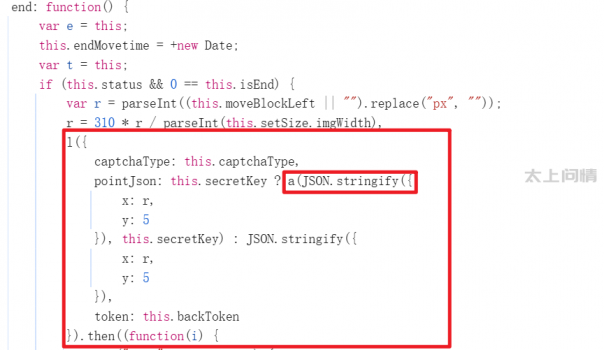Python 爬虫验证码处理方案
简介
嗨,大家好,我是太上问情,一个学习爬虫好几年都还没有真正入门的小趴菜。
本文记录本人 Python 爬虫学习过程中,验证码 处理的各种解决方案,欢迎大家指正。
本人计划在本文完成如下验证码的处理,目前一个都没有完成,希望我能很快完成!
- [ ] 数字验证码
- [ ] 字母验证码
- [ ] 文字验证码
- [ ] 图像验证码
本文编写过程中参考、引用的文章:
滑动验证码
滑动验证码通常分为两张图片,一张背景图,一张前景图。通过鼠标拖动下方的箭头,带动前景图移动到背景图的缺口处,从而实现人机验证。

解决思路
- 获取前景图、背景图保存到本地
- 本地计算出前景图移动到缺口所需要的坐标值
- 然后通过 selenium 或者 Python 调用接口的方式实现验证
实战
基本信息
本次测试的验证码平台为 https://captcha.ruijie.com.cn, 计划通过 Python 调用接口的方式进行验证。
由于该网站的验证码信息采用了 Base64 编码,且接口验证还进行了加密处理。所以我们还需要进行 Base64 编码字符串转图片和一个简单的 JS 逆向过程。
获取验证码的接口
接口地址:https://captcha.ruijie.com.cn/captcha/get
请求
接口入参如下,请求参数中有 验证码类型、连接ID、当前时间戳 三个参数,我们在请求图片的时候只需要将 ts 设置为当前时间戳即可。
{
"captchaType": "blockPuzzle",
"clientUid": "slider-dc12464e-d331-43f1-b71a-ab05e5ab3e8d",
"ts": 1733533403343
}
响应
接口响应中,包含了 密匙、token、前景图、背景图 这四个主要信息,其中前景图、背景图为 Base64 编码的字符串,需要解码为图片才可以保存到本地,密匙、token 用于在后面的校验接口中使用。
{
"repCode": "0000",
"repMsg": null,
"repData": {
"captchaId": null,
"projectCode": null,
"captchaType": null,
"captchaOriginalPath": null,
"captchaFontType": null,
"captchaFontSize": null,
// 密匙
"secretKey": "cpXUlRLZ1tmcriu3",
// 背景图Base64编码字符串
"originalImageBase64": "iVBORw0KGgoAAAANSUhECC",
"point": null,
// 前景图Base64编码字符串
"jigsawImageBase64": "iVBORw0KGgoAAAANErkJggg==",
"wordList": null,
"pointList": null,
"pointJson": null,
// 验证码token
"token": "3b6b930436a34153883fc54e8ce1a37f&&slider-dc12464e-d331-43f1-b71a-ab05e5ab3e8d",
"result": false,
"captchaVerification": null,
"clientUid": null,
"ts": null,
"browserInfo": null
},
"success": true
}
保存验证码到本地
调用接口获取验证码
def get_captcha():
"""
获取验证码的接口
:return:
"" "
# 请求参数
json_data = {
# 验证码类型
'captchaType': 'blockPuzzle',
# 连接 ID
'clientUid': 'slider-dc12464e-d331-43f1-b71a-ab05e5ab3e8d',
# 当前时间戳
'ts': int(time.time()),
}
# 发起请求
response = requests.post('https://captcha.ruijie.com.cn/captcha/get', headers = headers, json = json_data)
if response.status_code == 200 and response.json()['success'] == True:
print('请求验证码成功,正在将验证码 base64 编码转为图片保存至本地')
rep_data = response.json()['repData']
# 拼图块
base64_to_img_and_save(rep_data ['jigsawImageBase64'], 'img/target.png')
# 原始图片
base64_to_img_and_save(rep_data ['originalImageBase64'], 'img/background.png')
print('拼图保存成功!')
print(colored(f'获取验证码-原始响应:{response.json()}'))
return rep_data ['token'], rep_data ['secretKey']
base64编码字符串转图片并保存到本地
def base64_to_img_and_save(base64_str, file_name):
base64.b64decode(base64_str, validate = True)
with open(file_name, 'wb') as f:
f.write(base64.b64decode(base64_str))
计算滑动距离
计算前景图到背景图的距离
calc_x.py是用于计算前景图移动到背景图重合位置的坐标的,是由CSDN搜索到的上海悠悠同学提供的计算方案,我这边测试过后直接使用了。
import cv2
# 作者-上海悠悠 QQ 交流群:730246532
# blog 地址 https://www.cnblogs.com/yoyoketang/
def show(name):
'''展示圈出来的位置'''
cv2.imshow('Show', name)
cv2.waitKey(0)
cv2.destroyAllWindows()
def _tran_canny(image):
"" "消除噪声" ""
image = cv2.GaussianBlur(image, (3, 3), 0)
return cv2.Canny(image, 50, 150)
def get_width(image_path):
'''获取图片宽度'''
image = cv2.imread(image_path)
size = image.shape
return size [1]
def detect_displacement(img_slider_path, image_background_path):
"" "detect displacement" ""
# # 参数 0 是灰度模式
image = cv2.imread(img_slider_path, 0)
template = cv2.imread(image_background_path, 0)
# 寻找最佳匹配
res = cv2.matchTemplate(_tran_canny(image), _tran_canny(template), cv2.TM_CCOEFF_NORMED)
# 最小值,最大值,并得到最小值, 最大值的索引
min_val, max_val, min_loc, max_loc = cv2.minMaxLoc(res)
top_left = max_loc [0] # 横坐标
# 展示圈出来的区域
x, y = max_loc # 获取 x, y 位置坐标
w, h = image.shape [::-1] # 宽高
cv2.rectangle(template, (x, y), (x + w, y + h), (7, 249, 151), 2)
# 展示标记位置,调试完毕后应该注释
# show(template)
return top_left
if __name__ == '__main__':
top_left = detect_displacement("img/target.png", "img/background.png") + 5
print(top_left)
计算最终移动坐标
上面计算的只是前景图移动到背景图所需要的距离,但是在web页面中我们实际需要移动的距离并不是这个,还需要对页面滑块的绑定事件进行分析,从而得到最终坐标。

阅读网页Js源码之后,得到了如下计算方式:
# 计算滑动距离
x = calc_x.detect_displacement('img/target.png', 'img/background.png')
print(f'计算鼠标滑动距离:{x}')
image_width = calc_x.get_width('img/background.png')
print(f'获取图片宽度:{image_width}')
x = int(310 * x / int(image_width))
point = {'x': x, 'y': 5}
print(f'最终坐标:{point}')
如果是使用selenium等web自动化测试框架的话,此时已经可以结束了,使用这个坐标去验证即可。
校验验证码的接口
接口地址:https://captcha.ruijie.com.cn/captcha/check
入参
校验接口的入参中,唯一麻烦的是pointJson字段,这是一个经过加密后的坐标信息。我们必须保证我们使用Python调用校验接口时,入参格式和web端保持完全一致,这样才能通过校验。
{
// 和获取验证码时保持一致即可
"captchaType": "blockPuzzle",
// 加密后的移动坐标
"pointJson": "vl/vcOtbY1gnkqEQUxfmyKFuwO06Lxq9zVzrIHNpusk=",
// 获取验证码时返回的token
"token": "94a1b50afeff4526985be645291cf015&&slider-dc12464e-d331-43f1-b71a-ab05e5ab3e8d"
}
响应
{
// repcode == “000”即为校验通过
"repCode": "0000",
"repMsg": null,
"repData": {
"captchaId": null,
"projectCode": null,
"captchaType": "blockPuzzle",
"captchaOriginalPath": null,
"captchaFontType": null,
"captchaFontSize": null,
"secretKey": null,
"originalImageBase64": null,
"point": null,
"jigsawImageBase64": null,
"wordList": null,
"pointList": null,
"pointJson": "xDYbVcQ519Oa0C2ZQkv3X7v9eLqUY1s9os47nIRiIhs=",
"token": "dde9b4cc6f0d41079155911b3ddc4870",
"result": true,
"captchaVerification": null,
"clientUid": null,
"ts": null,
"browserInfo": null
},
"success": true
}
解析坐标加密规则
Debugger 查找加密规则………………


经过Js调试发现,加密规则为下面的a(e)方法,通过传入获取验证码时得到的secretKey和json格式的坐标值进行加密。
l({
captchaType: this.captchaType,
// 看这里
pointJson: this.secretKey ? a(JSON.stringify({
x: r,
y: 5
}), this.secretKey) : JSON.stringify({
x: r,
y: 5
}),
token: this.backToken
})
// 加密方法
function a(e) {
var t = arguments.length > 1 && void 0 !== arguments[1] ? arguments[1] : "XwKsGlMcdPMEhR1B"
, r = o.a.enc.Utf8.parse(t)
, i = o.a.enc.Utf8.parse(e)
, n = o.a.AES.encrypt(i, r, {
mode: o.a.mode.ECB,
padding: o.a.pad.Pkcs7
});
return n.toString()
}
那么,我们根据这个加密规则,重新编写我们能够调用的加密方法保存至encrypted.js,后续在Python中使用execjs调用该文件中的方法。
const crypto = require("crypto-js");
/**
* 使用AES加密算法加密数据。
* @param {{x: number, y: number}} data - 待加密的数据。
* @param {string} [key='XwKsGlMcdPMEhR1B'] - 加密使用的密钥。
* @returns {string} 加密后的字符串。
*/
function encryptData(data, key = 'XwKsGlMcdPMEhR1B') {
// 将Json对象转为字符串
data = JSON.stringify(data);
// 将字符串转换为Utf8格式的数据
const keyUtf8 = crypto.enc.Utf8.parse(key);
const dataUtf8 = crypto.enc.Utf8.parse(data);
// 使用AES加密数据,ECB模式,PKCS7填充
const encrypted = crypto.AES.encrypt(dataUtf8, keyUtf8, {
mode: crypto.mode.ECB,
padding: crypto.pad.Pkcs7
});
// 返回加密后的字符串
return encrypted.toString();
}
// 测试加密方法生成的内容和web页面生成的内容是否一致
const jsonData = {
x: 77.96969696969697,
y: 5
};
const encryptedData = encryptData(jsonData, 'Xwi0izQSmFaqLjeJ');
console.log(encryptedData);
// 输出
OniLz5FGMjM0HFF5cYfxnjiyh9xRFd5IVH79YBp/Aks=
完整代码 and 校验
完整代码
import base64
import requests
import time
import calc_x
import execjs
# 获取验证码的接口
def get_captcha():
# 请求参数
json_data = {
# 验证码类型
'captchaType': 'blockPuzzle',
# 连接ID
'clientUid': 'slider-dc12464e-d331-43f1-b71a-ab05e5ab3e8d',
# 当前时间戳
'ts': int(time.time()),
}
# 发起请求
response = requests.post('https://captcha.ruijie.com.cn/captcha/get', headers=headers, json=json_data)
# 如果请求成功并且返回结果为True
if response.status_code == 200 and response.json()['success'] == True:
print('请求验证码成功,正在将验证码base64编码转为图片保存至本地')
rep_data = response.json()['repData']
# 将拼图块的base64编码转换为图片并保存
base64_to_img_and_save(rep_data['jigsawImageBase64'], 'img/target.png')
# 将原始图片的base64编码转换为图片并保存
base64_to_img_and_save(rep_data['originalImageBase64'], 'img/background.png')
print('拼图保存成功!')
print(f'获取验证码-原始响应:{response.json()}')
return rep_data['token'], rep_data['secretKey']
# 校验验证码
def check(token, pointJson):
json_data = {
'captchaType': 'blockPuzzle',
'pointJson': pointJson,
'token': token,
}
response = requests.post('https://captcha.ruijie.com.cn/captcha/check', headers=headers, json=json_data)
# 如果校验成功
if response.status_code == 200 and response.json()['success'] == True:
print('验证码校验成功')
print(response.json())
# 将base64编码转换为图片并保存
def base64_to_img_and_save(base64_str, file_name):
base64.b64decode(base64_str, validate=True)
with open(file_name, 'wb') as f:
f.write(base64.b64decode(base64_str))
# 使用JavaScript算法计算点的坐标
def calc_pointJson(json, key):
with open('encrypted.js', 'r', encoding='utf-8') as f:
js_code = f.read()
# 编译JavaScript代码
context = execjs.compile(js_code)
result = context.call('encryptData', json, key)
return result
if __name__ == '__main__':
headers = {
# 请求头信息,模拟浏览器发送请求
'Accept': 'application/json, text/plain, */*',
'Accept-Language': 'zh-CN,zh;q=0.9',
'Connection': 'keep-alive',
'Content-Type': 'application/json; charset=UTF-8',
'Origin': 'https://captcha.ruijie.com.cn',
'Referer': 'https://captcha.ruijie.com.cn/',
'Sec-Fetch-Dest': 'empty',
'Sec-Fetch-Mode': 'cors',
'Sec-Fetch-Site': 'same-origin',
'User-Agent': 'Mozilla/5.0 (Windows NT 10.0; Win64; x64) AppleWebKit/537.36 (KHTML, like Gecko) Chrome/131.0.0.0 Safari/537.36',
'X-Requested-With': 'XMLHttpRequest',
'sec-ch-ua': '"Google Chrome";v="131", "Chromium";v="131", "Not_A Brand";v="24"',
'sec-ch-ua-mobile': '?0',
'sec-ch-ua-platform': '"Windows"',
}
# 获取验证码
token, secretKey = get_captcha()
print(f'图片token:{token}')
print(f'图片校验Key:{secretKey}')
# 计算滑动距离
x = calc_x.detect_displacement('img/target.png', 'img/background.png')
print(f'计算鼠标滑动距离:{x}')
image_width = calc_x.get_width('img/background.png')
print(f'获取图片宽度:{image_width}')
x = int(310 * x / int(image_width))
point = {'x': x, 'y': 5}
print(f'最终坐标:{point}')
pointJson = calc_pointJson(point, secretKey)
print(f'调用js加密算法获取加密后的坐标Json:{pointJson}')
# 校验
check(token, pointJson)
校验




评论区